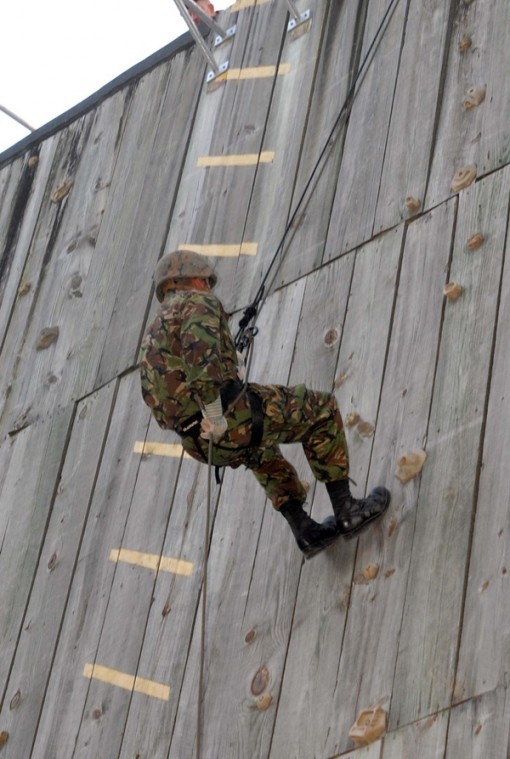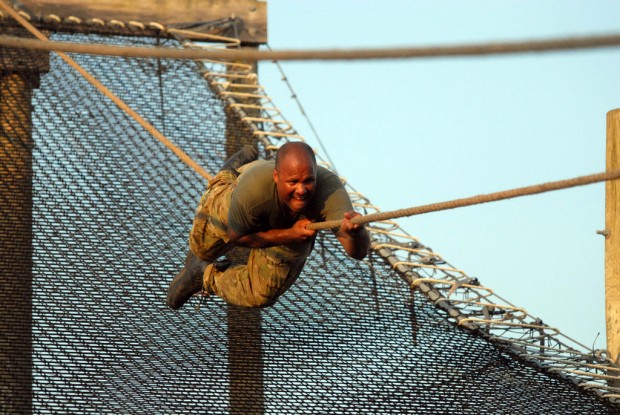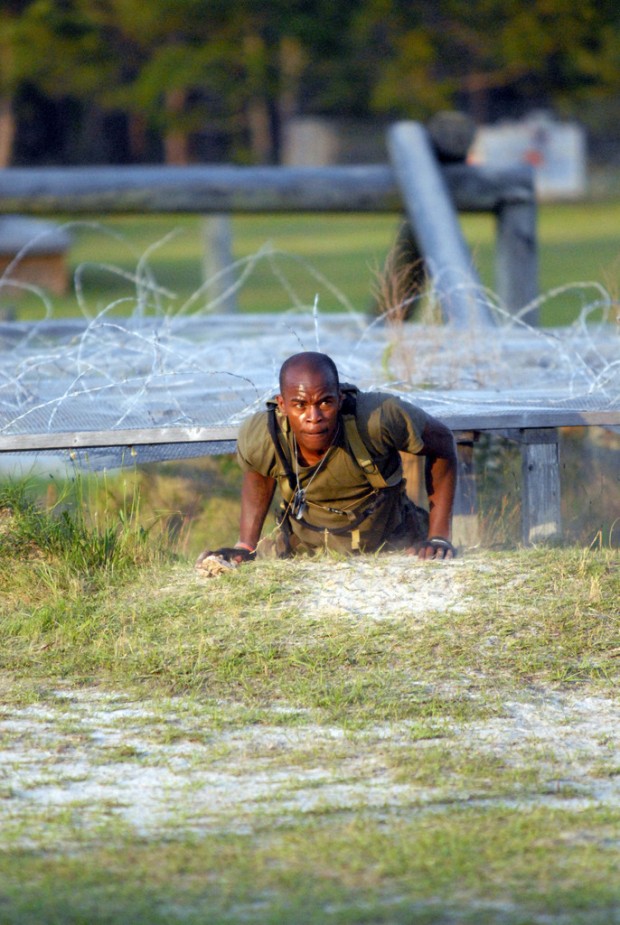Camp Lejeune Paper Celebrates Bermuda Ties
The Bermuda Regiment’s long association with North Carolina’s Camp Lejeune are celebrated in a major report in the US Marine Corps base newspaper “The Globe” today [May 18].
For decades Bermudian soldiers have trained at Camp Lejeune, taking advantage of its 156,000 acres, 11 miles of beach, 32 gun positions, 48 tactical landing zones, three state-of-the-art training facilities for Military Operations in Urban Terrain and 80 live fire ranges.
Home of Marine Expeditionary Forces in Readiness, Camp Lejeune is the largest Marine Corps Base on the East Coast where approximately 40,000 US Marines are stationed.
At the weekend more than 160 Bermuda Regiment soldiers returned to the island after completing a two-week training camp at the North Carolina base.
In today’s edition of the Camp Lejeune newspaper, US Marine Cpl. Jonathan G. Wright reports on the Bermuda Regiment’s most recent exercises and the historic ties between Warwick Camp and the North Carolina base. His report appears in full below:
Bermuda Regiment soldiers participating in Exercise Bermuda Warrior at Camp Lejeune
One speaks with a deep Southern drawl while the other has a modified British accent, clad in camouflage utility patterns that are vastly different in scheme and design.
Weapons, tactics, even rank structure is different, yet when standing side-by-side, these two warriors possess similar ideals — to protect and serve their respective countries in matters both foreign and domestic .
Elements from the Bermuda Regiment, the home defense unit of the British Overseas Territory of Bermuda, spent approximately two weeks aboard Marine Corps Base Camp Lejeune to cross-train and observe in a multitude of operational skills throughout the base during Exercise Bermuda Warrior, April 30 through May 13.
The 180 Bermuda Regiment soldiers split into two companies, Alpha and Support, sharpening skills and learning new training techniques to bring back to their home base.
“For the past 30 years or so we’ve been training with Camp Lejeune every other year,” said Capt. Ben Beasley, adjutant for the Bermuda Regiment. “We are lacking in certain training facilities on Bermuda, so we come here to complete our full annual training regimen.”
The 20.6-square-mile island, smaller than Manhattan, lacks the necessary space to house such training areas as known-distance rifle ranges and unfamiliar territory to navigate. Also, the facilities that are on the island are limited in many aspects for strictly civilian operations, such as their one hospital, making it unavailable for the regiment medics to train in.
“On our side of their visit, 13 members of the regiment who fill medical billets are observing various clinical operations here at the hospital,” said Cmdr. Marnie Buchanan, department head of the Staff Education and Training Department of Naval Hospital Camp Lejeune [NHCL]. “For two days they observed operations in such departments as the operating rooms and labor and delivery — things they may not have had the chance to do in their hospital.”
The Bermuda Regiment is a battalion-sized force that acts as a support augment for the Bermudian police, mirroring the United States’ reservist side of the National Guard. With more than 600 total soldiers, various units constantly train abroad to make up for whatever lack of training facilities there may be in garrison.
“Training such as the type conducted on this trip continually broaden the soldiers’ military experience and makes the units tighter,” said Maj. Philip Birch, staff officer with the regiment. “While the regiment’s main focus is internal security — disaster relief and intervening in any civil unrest situations — we also serve as an expeditionary force, so the field training we receive here is among the most important exercises we do.”
The soldiers of Company A spent the two weeks conducting training operations in Military Operations on Urban Terrain, rappelling and firing the ARWEN 37, a multi-shot riot control weapon. The soldiers of Support Company conducted similar training for the first week, then broke off with their Camp Lejeune counterparts for job-specific tutelage, such as the medics going to NHCL and the Field Medical Training Battalion [FMTB], Regiment Provosts observing base Provost Marshal’s Office operations and Regiment boatsmen being attached to the Joint Maritime Training Center at Courthouse Bay.
“The training we’ve observed here is something we couldn’t have learned back home,” said Lance Cpl. Colby Pimental, a parade and field medic with the regiment, training at the FMTB and NHCL. “It greatly increases our capabilities when we learn more medical procedures that we can bring home and adapt to our current practices.”
As the two-week cross-training wound down, soldiers of the regiment and Camp Lejeune Marines shared new ideas and operating procedures to better themselves with and pass on to others.
The purpose of the exercise was not to just learn new techniques for internal and expeditionary security, but to also strengthen the bond between these two militaries that reaches out across 1,000 miles of ocean and unites these warriors in a common cause — that of brotherhood and strength to forge foreign friendships.
“The soldiers have been more than happy to work with the Marines, and this year more than ever it has been evident that they have been working hard and getting a lot out of the training,” said Maj. Julian Wheddon, training officer for the regiment. “The facilities on Camp Lejeune have been exceptional and the Marines were welcoming and happy to work with us. It’s been a great two weeks with our American brothers.”
Read More About
Category: All




